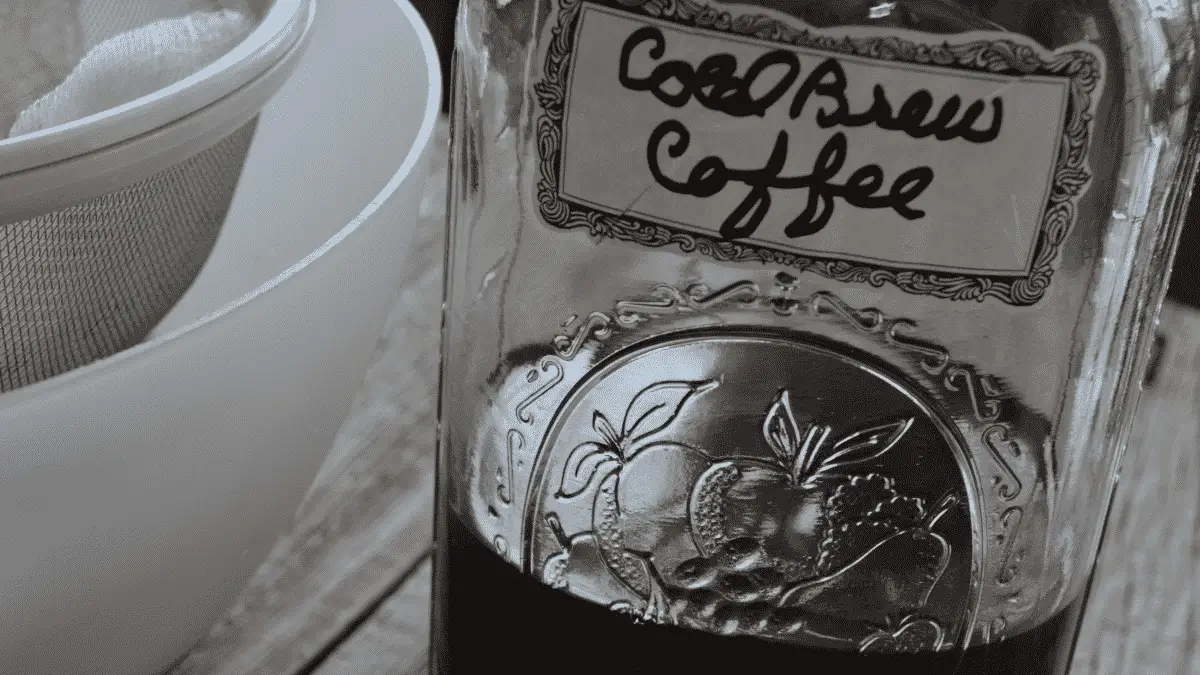One of the great paradoxes of cold brew is that while it can be straightforward to make up a batch, you will need to get several vital steps right to make up a great batch. Your ratio of coffee to water, the grind of your beans, the length of your brew time… all of these factors work together and depend upon each other when it comes to brewing up the best version of your favorite coffee.
So what about the ‘cold’ part of cold brew? Can you make it without using a fridge? Indeed, you can absolutely make your cold brew concentrate without a refrigerator. As long as the water you have used is cool enough, and your ambient room temperature is not excessively warm, you can keep your batch of cold brew on the kitchen bench or in a cupboard throughout the whole brewing process.
However, it is essential to note that once the brewing process is over and you have filtered your cold brew concentrate from the coffee grounds, you must keep it in the fridge. Besides issues of spoiling, cold brew concentrate derives much of its distinctive flavor and aroma from being served cold, and you run the risk of a subpar version of cold brew if your concentrate is not kept chilled.
What do I need to consider when making cold brew at room temperature?
Making cold brew, or really any type of coffee for that matter, is an exact exercise. In fact, in some ways it is almost akin to a science experiment!
Given that water is the key ingredient (apart from the coffee beans, of course!) in coffee brewing, it is not surprising that making adjustments to the volume and the temperature of water during the brewing process can result in very different types of coffee.
One of the basics that you should know about this process relates to the temperature of water, and its impact on the extraction rate of coffee beans. For example, an espresso shot is pulled – or brewed – at very high temperatures, typically between 194 to 204 degrees Fahrenheit. As a result, an espresso shot is completely brewed in less than 30 seconds.
Although water pressure also plays a part in making espresso such a quick brew, the temperature principle applies to other types of hot brewed coffees. French press, filter coffee, and percolator coffee are all brewed and ready for drinking within a relatively short time.
On the other side of the equation, cold brew concentrate can take almost a whole day to brew. This is entirely due to the relative temperature of the water used, which is much, much colder than the nearly boiling water used in hot brewed coffees!
Even within the cold brewing process, a few degrees difference will alter the time it takes for your cold brew concentrate to be completely extracted.
Given that the typical temperature of a fridge is approximately 40 degrees Fahrenheit, and the average room temperature sits somewhere between 68 and 72 degrees Fahrenheit, it stands to reason that cold brew that is brewed at room temperature will take less time to brew, as the water being used is not as cold.
The question of how much longer it takes to brew cold brew concentrate at room temperature will depend on your own personal preferences, and how strong you like your cold brew to be. A basic rule of thumb states that it takes cold brew concentrate three to five hours less to achieve the same extraction level when brewed at room temperature.
Besides this timing factor, the other main consideration for brewing cold brew at room temperature relates to your individual room’s ambient temperature. If you are making up a batch of cold brew in the middle of summer, it could well mean that your room temperature is well above the average.
If this is the case, you may wish to keep your cold brew in a dark, cool cupboard. This will help regulate the brewing and extraction process’s speed and prevent you from ending up with a bitter, over-extracted brew.
What happens if you don’t refrigerate cold brew?
Given that cold brew concentrate is a fairly stable beverage, and not particularly given to mold growth, you may well ask if it is possible to store your cold brew concentrate at room temperature after the brewing process is complete.
Unfortunately, it is strongly advised that you never keep cold brew concentrate at room temperature, and only ever keep it in the fridge.
It may seem contradictory to hear that you can brew cold brew at room temperature, but need to store the fridge’s finished product. However, there are a couple of important reasons why this is the case. The first relates to the shelf life of cold brew concentrate, and the second relates to its taste, flavor, and aroma profiles.
Shelf life of cold brew
The shelf life of cold brew coffee is relatively long, which is why it is such a great beverage to make up in big batches. If kept properly – refrigerated in an airtight container – your cold brew concentrate can last for up to a week without any noticeable loss of taste or flavor.
As with any other type of food or beverage, the lower temperature in your fridge prevents your cold brew from spoiling. If you were to keep your cold brew at room temperature, it may only last for a couple of days.
Taste, flavor and aroma of cold brew
Brewing coffee at lower temperatures brings out a whole host of flavors and aromas that are not typically present in hot brewed coffee.
Naturally sweeter, and with far fewer bitter and astringent notes, cold brew coffee is prized for its unique fullness and richness of flavor. This can only be achieved by brewing coffee grounds at low temperatures for long periods.
The highly sought after taste, flavor and aroma of cold brew coffee is again heightened when served cold. This is why you will often see cold brew served over ice, or mixed with cold filtered water or milk.
If you do not keep your cold brew refrigerated, many of these unique qualities that make cold brew so special will not shine through. Taste will be compromised, flavor will be muted, and aroma will be dampened.
How do you know if cold brew has gone bad?
After all the effort of making up your batch of cold brew, the last thing you want is for it to go bad.
Cold brew that has gone bad will usually have a sharp, acidic taste and may even have an unpleasant aroma. Just in the same way that a hot brewed coffee that has been left too long will taste flat and bitter, your cold brew will be unpleasant to smell and taste if it has gone bad.
Some causes of bad cold brew are as follows:
- Being left for too long, far beyond the advised time frame of a week.
- Overly oxidised cold brew that has not been kept in an airtight container.
- Cold brew that has not been refrigerated.
In some rare circumstances, your cold brew may even become moldy. This will be immediately obvious, as you will be able to see mold patches and spores floating on top of your cold brew. If this occurs, throw out the cold brew and sterilize the container with boiling water and washing detergent.
If you can not notice any odd aromas or tastes but still suspect that your cold brew might have gone bad, it is probably best to dispose of it. As the saying goes, life is far too short to drink bad coffee!
What are other options for my cold brew, apart from the fridge?
If you want to make up a batch of cold brew at a lower temperature than ambient room temperature but don’t have enough time or room in your fridge, you can always make up an ice bath for your cold brew.
The process for this is very simple. Make up your batch of cold brew as usual. Now, find a bucket or large dish that can hold several inches of water and stand your mason jar or cold brew toddy in it.
Fill the bucket or dish with as much ice as possible, and leave it in a dark, cool area of your home. The ice bath will help keep your cold brew chilled, and should remain cold for several hours. You may need to refill your ice bath at some stage during the brewing process.
This technique can help achieve some of the same effects as making your cold brew in the fridge, but will take slightly less time and free up much more space in your fridge!
It goes without saying that the ice bath process is only appropriate for the brewing stage. Once you have your filtered cold brew concentrate, it needs to move to the fridge as soon as possible!

